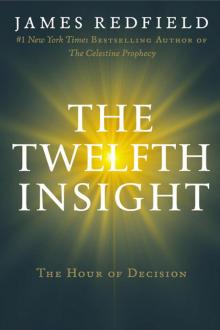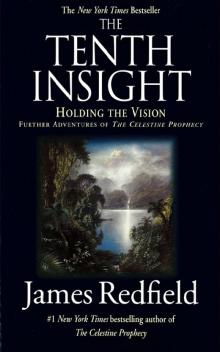- Home
- James Redfield
The Secret of Shambhala: In Search of the Eleventh Insight Page 2
The Secret of Shambhala: In Search of the Eleventh Insight Read online
Page 2
“What are you looking for?” I asked. “What’s going on? You scared me half to death.”
He walked back toward me. “I had to see you. Everything has changed. I’m back where I was.”
“What do you mean?”
He smiled at me. “I think all this is supposed to be happening, but I can no longer enter the other dimensions mentally, the way I could. I can still raise my energy to some degree, but I’m now firmly here in this world.” He looked away for an instant. “It’s almost as though what we did in understanding the Tenth Insight was just a taste, a preview, a glimpse of the future like in a near-death experience, and now it’s over. Whatever we’re to do now, we have to do right here on this Earth.”
“I never could do it again anyway,” I said.
Wil looked me in the eye. “You know, we’ve received a lot of information about human evolution, about paying attention, about being guided forward by intuition and the coincidences. We’ve been given a mandate to hold a new vision, all of us. Only we aren’t making it happen at the level we can. Something in our knowledge is still missing.”
He paused for a minute and then said, “I’m not sure why yet, but we have to go to Asia… somewhere near Tibet. Something is happening there. Something we have to know.”
I was startled. Young Natalie had said the same thing.
Wil walked back to the window again, peering out.
“Why do you keep looking out the window?” I asked. “And why did you slip into the house? Why didn’t you just knock? What’s going on?”
“Probably nothing,” he replied. “I just thought I was being followed earlier today. I couldn’t be sure.”
He walked back toward me. “I can’t explain everything now. I’m not even sure myself of what is happening. But there is a place in Asia we must find. Can you meet me at the Hotel Himalaya in Kathmandu on the sixteenth?”
“Wait a minute! Wil, I have things to do here. I’m committed to…”
Wil looked at me with an expression I’ve never seen on anyone’s face but his, a pure mixture of adventure and total intent. “It’s okay,” he said. “If you’re not there on the sixteenth, you’re not there. Just be sure if you come that you stay perfectly alert. Something will occur.”
He was serious about giving me the choice, but he was smiling broadly.
I looked away, unamused. I didn’t want to do this.
* * *
The next morning I decided I would tell no one where I was going except Charlene. The only problem was that she was on an assignment out of the country and it was impossible to reach her directly. All I could do was leave her an E-mail.
I walked over to my computer and sent it, wondering, as I always did, about the security of the Internet. Hackers can get into the most secure corporate and government computers. How hard would it be to intercept E-mail messages… especially when one remembers that the Internet was originally set up by the Defense Department as a link to their research confidants at major universities? Is the whole Internet monitored? I shook off the concern, concluding that I was being silly. Mine was one message among tens of millions. Who would care?
While I was on the computer, I made travel arrangements to arrive in Kathmandu, Nepal, on the sixteenth and stay at the Himalaya. I would have to leave in two days, I thought, barely enough time to make preparations.
I shook my head. Part of me was fascinated with the idea of going to Tibet. I knew that its geography was one of the most beautiful and mysterious in the world. But it was also a country under the repressive control of the Chinese government, and I knew it could be a dangerous place. My plan was to go only as far with this adventure as felt safe. No more getting in over my head and letting myself be pulled into something I couldn’t control.
Wil had left my home as quickly as he had arrived, without telling me anything more, and my mind was full of questions. What did he know of this place near Tibet? And why was an adolescent girl telling me to go there? Wil was being very cautious. Why? I wasn’t going a step beyond Kathmandu until I found out.
When the day came, I tried to stay very alert through the long flights to Frankfurt, New Delhi, and then Kathmandu, but nothing of note occurred. At the Himalaya, I checked in under my own name and put my things in the room, then began to look around, ending up at the lobby restaurant. Sitting there, I expected Wil to walk in any moment, but nothing happened. After an hour the idea of going to the pool came to mind, so I hailed a bellman and found out it was outside. It would be slightly chilly, but the sun was bright, and I knew the fresh air would help me adjust to the altitude.
I walked out the exit and found the pool in between the L-shaped wings of the building. There were more people there than I would have imagined, although few were talking. As I took a chair at one of the tables, I noticed that the people sitting around me—Asians mostly, with a few Europeans scattered about—seemed to be either stressed-out or very homesick. They frowned at each other and snapped at the hotel attendants for drinks and papers, avoiding eye contact at all cost.
Gradually my mood began to decline as well. Here I was, I thought, cooped up in one more hotel halfway around the world, without a friendly face anywhere. I took a breath and again remembered Wil’s admonition to stay alert, reminding myself that he was talking about watching for the subtle twists and turns of synchronicity, those mysterious coincidences that could pop up in a second to push one’s life in a new direction.
Perceiving this mysterious flow, I knew, remained the central experience of real spirituality, direct evidence that something deeper was operating behind the scenes of the human drama. The problem has always been the sporadic nature of this perception; it comes along for a while to entice us and then, just as quickly, disappears.
As I looked around the area, my eyes fell on a tall man with black hair who was walking out of the hotel door heading straight for me. He was dressed in tan slacks and a stylish white sweater and carried a folded newspaper under his arm. He walked along the path through the loungers and sat at a table directly to my right. As he took out his newspaper, he looked around and nodded to me, smiling radiantly. Then he called an attendant over and ordered some water. He was Asian in appearance, but he spoke in fluent English with no detectable accent.
When his water arrived, he signed the ticket and began to read. There was something immediately attractive about this man, but I couldn’t put my finger on what it was. He just radiated a pleasant demeanor and energy, and periodically he would stop reading and look around with a wide smile. At one point he made eye contact with one of the crabby gentlemen directly in front of me.
I was half expecting the sullen man to look away quickly, but instead he smiled back at the dark-haired man and they began to engage in light conversation in what sounded like Nepalese. At one point they even burst out laughing. Attracted by the conversation, several other people at nearby tables became amused, and one said something that created another round of laughter.
I looked out on the scene with interest. Something was happening here, I thought. The mood around me was changing.
“My God,” the dark-haired man stammered, looking in my direction. “Have you seen this?”
I looked around. Everybody else seemed to have returned to their reading, and he was pointing to something in the paper and moving his chair around to get closer to me.
“They’ve released another prayer study,” he added. “It’s fascinating.”
“What did they find?” I asked.
“They were studying the effect of praying for people who have medical problems, and found that patients who received regular prayers from others had fewer complications and got well faster, even when they weren’t aware that prayers were being said. It’s undeniable proof that the force of prayer is real. But they also found something else. They found that the most effective prayer of all was structured not as a request, but as an affirmation.”
“I’m not sure what you mean,” I said.
; He was staring at me with crystal-blue eyes. “They set up the study to test two types of prayer. The first was just asking God, or the divine, to intervene, to help a sick person. The other was to simply affirm, with faith, that God will help the person. Do you see the difference?”
“I’m still not sure.”
“A prayer that asks God to intervene assumes that God can intervene but only if he decides to honor our request. It assumes that we have no role except to ask. The other form of prayer assumes that God is ready and willing but has set up the laws of human existence so that whether the request is fulfilled depends in some part on the certainty of our belief that it will be done. So our prayer must be an affirmation that voices this faith. In the study, this kind of prayer proved to be most effective.”
I nodded. I was beginning to get it.
The man looked away as though thinking to himself and then continued. “All the great prayers in the Bible are not requests, they are affirmations. Think of the Lord’s Prayer. It goes, ‘Thy will be done on Earth as it is in Heaven. Give us this day our daily bread, and forgive us our trespasses.’ It doesn’t say please can we have some food, and it doesn’t say please can we be forgiven. It merely affirms that these things are ready to happen already, and by faithfully assuming that they will, we make it so.”
He paused again, as though expecting a question, still smiling.
I had to chuckle. His good mood was so contagious.
“Some scientists are theorizing,” he went on, “that these findings also imply something else, something that has a profound significance for every person alive. They maintain that if our expectations, our faithful assumptions, are what makes prayer work, then each of us is beaming a force of prayer-energy out into the world all the time, whether we realize it or not. Do you see how this is true?”
He continued without waiting for me to answer. “If prayer is an affirmation based on our expectations, our faith, then all our expectations have a prayer effect. We are, in fact, praying all the time for some kind of future for ourselves and others, we just aren’t fully aware of it.”
He looked at me as though he had just dropped a bombshell.
“Can you imagine?” he continued. “Science is now confirming the assertions of the most esoteric mystics of every religion. They all say we have a mental and spiritual influence on what happens to us in life. Remember the scriptures about how faith the size of a mustard seed can move mountains. What if this ability is the secret of true success in life, of creating true community.” His eyes twinkled as though he knew more than he was saying. “We all have to figure out how this works. It’s time.”
I was smiling back at this man, intrigued by what he was saying, still amazed at the transformation in the mood around the pool, when I instinctively glanced around to the left in the way we do when we feel someone looking at us. I caught one of the pool attendants staring at me from the entrance door. When our eyes met, he quickly looked away and began to walk back along the sidewalk that led to an elevator.
“Excuse me, sir,” came a voice from behind me.
When I looked around, I realized it was another attendant.
“May I serve you a drink?” he asked.
“No… thank you,” I replied. “I’ll wait awhile.
When I looked back toward the man on the sidewalk, he was gone. For a moment I surveyed the area, looking for him. When I finally looked over to my right where the dark-haired man had been sitting, he was gone too.
I got up and asked the man at the table in front of me if he had seen which way the man with the paper had walked. He shook his head and looked away curtly.
For the rest of the afternoon I stayed in my room. The events at the pool were disconcerting. Who was the man telling me about prayer? Was there a synchronicity involved with this information? And why was the attendant staring at me? And where was Wil?
Around dusk, after a long nap, I ventured out again, deciding to walk down the street a few blocks to an outdoor restaurant I heard one of the guests mention.
“Very close. Perfectly safe,” the bespectacled concierge told me when I asked him how to get there. “No problem.”
I walked out of the lobby into the fading light, keeping an eye out for Wil. The street was crowded with people and I pushed my way through. When I arrived at the restaurant, I was given a small corner table next to a four-foot-high wrought-iron fence that separated the dining area from the street. I ate a leisurely dinner and read an English newspaper, keeping the table for more than an hour.
At one point I grew uncomfortable. I felt as though I was being watched again, only I couldn’t see anyone looking. I gazed around at the other tables, but no one seemed to be paying me the slightest attention. Standing up, I peered over the fence at the people on the street. Nothing. Struggling to shake the feeling, I paid the check and walked back toward the hotel.
As I neared the entrance, I caught sight of a man at the edge of a row of bushes about twenty feet away to my left. Our eyes met and he took a step toward me. I looked away and was walking past when I realized it was the attendant I had caught looking at me at the pool, only he was now dressed in sneakers and jeans with a plain blue shirt. He appeared to be about thirty, with very serious eyes. I hurried on by.
“Excuse me, sir,” he called out.
I continued to walk.
“Please,” he said. “I must speak with you.”
I moved a few yards farther so that I would be in sight of the doorman and bell staff, then asked, “What is it?”
He moved closer, half bowing. “You are someone I believe I am here to meet. You know Mr. Wilson James?”
“Wil? Yes. Where is he?”
“He is unable to come. He asked me to meet you instead.” He offered his hand and I took it reluctantly, telling him my name.
“I am Yin Doloe,” he replied.
“Are you an employee here at the hotel?” I asked.
“No, I’m sorry. A friend works here. I borrowed a jacket from him so I could look around. I wanted to see if you were here.”
I looked at him closely. My instincts told me he was telling the truth. But why the secrecy? Why didn’t he just walk up to me at the pool and ask who I was?
“Why has Wil been delayed?” I asked.
“I am not sure. He asked me to meet you and take you on to Lhasa. His plan, I believe, is to meet us there.”
I looked away. Things were beginning to feel ominous. I looked him over again, then said, “I’m not sure I want to do that. Why hasn’t Wil called me himself?”
“I’m sure there is an important reason,” Yin replied, taking a step toward me. “Wil was very insistent that I bring you to him. He needs you.”
Yin’s eyes were pleading. “Could we leave tomorrow?”
“Let’s do this,” I said. “Why don’t you come inside and we’ll have a cup of coffee and talk about the situation?”
He was looking around as though afraid of something. “Please, I’ll come back at eight tomorrow morning. Wil has already arranged a flight and visa for you.” He smiled, then scurried away before I could protest.
At 7:55 I walked out the door of the main lobby with only one satchel. The hotel had agreed to store everything else. My plan was to be back within the week—unless, of course, something strange happened once I left with Yin. In that case, I would be back immediately.
Exactly on time, Yin drove up in an old Toyota and we headed toward the airport. On the way over, he was cordial, but he continued to plead ignorance as to what was going on with Wil. I considered telling him what Natalie had said about the mysterious place in central Asia and what Wil had told me that night in my bedroom, just to see Yin’s reaction. But I decided against it. Better to just watch Yin closely, I thought, and see how things felt at the airport.
At the ticket desk, I found that a seat had indeed been purchased in my name for a flight to Lhasa. I looked around and tried to feel out the situation. Everything seemed normal. Yin was smilin
g, obviously in a good mood. Unfortunately the ticket clerk was not. She could speak only a little English and was very demanding. When she asked for my passport, I became ever more irritated and snapped back at her. At one point she stopped and glared at me, as though she was going to refuse to issue the tickets altogether.
Yin quickly stepped in and talked to her in a calm voice in her native Nepalese. After a few minutes her demeanor began to change. She never looked at me again, but she spoke pleasantly to Yin, actually laughing at something he said. A few minutes later we had our tickets and boarding passes and were sitting at a small table in a coffee shop near our gate. There was the strong smell of cigarettes everywhere.
“You have much anger,” Yin said. “And you don’t use your energy very well.”
I was taken aback. “What are you talking about?”
He looked at me with kindness. “I mean, you did nothing to help the woman at the counter with her mood.”
I immediately knew what he was getting at. In Peru the Eighth Insight had described a method of uplifting others by focusing on their faces in a particular way.
“You know the Insights?” I asked.
Yin nodded, still looking at me. “Yes,” he said. “But there is more.”
“Remembering to send energy is not that easy,” I added defensively.
In a very deliberate tone, Yin said, “But you must realize that you were already influencing her with your energy anyway, whether you know it or not. The important thing is how you set your… field of… of…” Yin was struggling to find the English word. “Field of intention,” he said finally. “Your prayer-field.”
I looked at him hard. Yin seemed to be describing prayer in the same way the dark-haired man had earlier.
“What are you talking about exactly?” I asked.
“Have you ever been in a room of people where the energy and mood were low, and then someone comes in who lifts everyone’s energy immediately, just by entering the room? This person’s energy field goes out ahead of him or her and touches everyone else.”

 The Twelfth Insight: The Hour of Decision
The Twelfth Insight: The Hour of Decision Secret of Shambhala
Secret of Shambhala The Tenth Insight: Holding the Vision
The Tenth Insight: Holding the Vision The Celestine Prophecy
The Celestine Prophecy The Celestine Prophecy: An Adventure
The Celestine Prophecy: An Adventure The Secret of Shambhala: In Search of the Eleventh Insight
The Secret of Shambhala: In Search of the Eleventh Insight